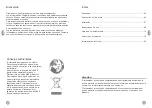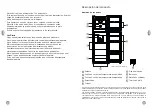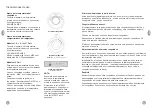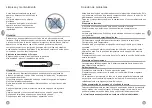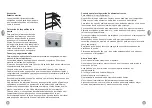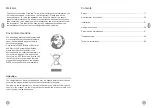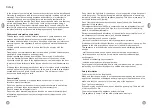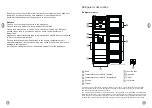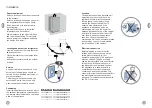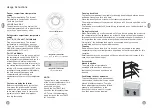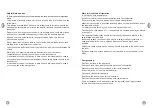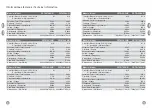
ENG
ENG
25
26
Helpful hints and tips
To help you make the most of the freezing process, here are some important
hints:
The maximum quantity of food which can be frozen in 24 hrs. Is shown on the
rating plate;
The freezing process takes 24 hours. No further food to be frozen should be
added during this period; only freeze top quality, fresh and thoroughly cleaned,
foodstuffs;
Prepare food in small portions to enable it to be rapidly and completely frozen
and to make it possible subsequently to thaw only the quantity required;
Wrap up the food in aluminium foil or polythene and make sure that the
packages are airtight;
Do not allow fresh, unfrozen food to touch food which is already frozen, thus
avoiding a rise in temperature of the latter;
Lean foods store better and longer than fatty ones; salt reduces the storage life
of food;
Water ices, if consumed immediately after removal from the freezer
compartment, can possibly cause the skin to be freeze burnt;
It is advisable to show the freezing in date on each individual pack to enable
you removal from the freezer compartment, can possibly cause the skin to be
freeze burnt;
It is advisable to show the freezing in date on each individual pack to enable
you to keep tab of the storage time.
Hints for fresh food refrigeration
To obtain the best performance:
Do not store warm food or evaporating liquids in the refrigerator
Do cover or wrap the food, particularly if it has a strong flavour
Make (all types): wrap in polythene bags and place on the glass shelves above
the vegetable drawer.
For safety, store in this way only one or two days at the most.
Cooked foods, cold dishes, etc...: these should be covered and may be placed
on any shelf.
Fruit and vegetables: these should be thoroughly cleaned and placed in the
special drawer(s) provided.
Butter and cheese: these should be placed in special airtight containers or
wrapped in aluminum foil or polythene bags to exclude as much air as
possible.
Milk bottle: these should have a cap and should be stored in the balconies on
the door.
Bananas, potatoes, onions and garlic, if not packed, must not be kept in the
fridge.
Energy saving
Don’t put hot food in the appliance;
Don’t pack food close together as this prevents air circulating;
Make sure food don’t touch the back of the compartment(s);
If electricity goes off, don’t open the door(s);
Don’t open the door(s) frequently;
Don’t keep the door(s) open for too long time;
Don’t set the thermostat on exceeding cold temperatures;
Some accessaries, such as drawers, can be removed to get larger storage
volume and lower energy consumption.


